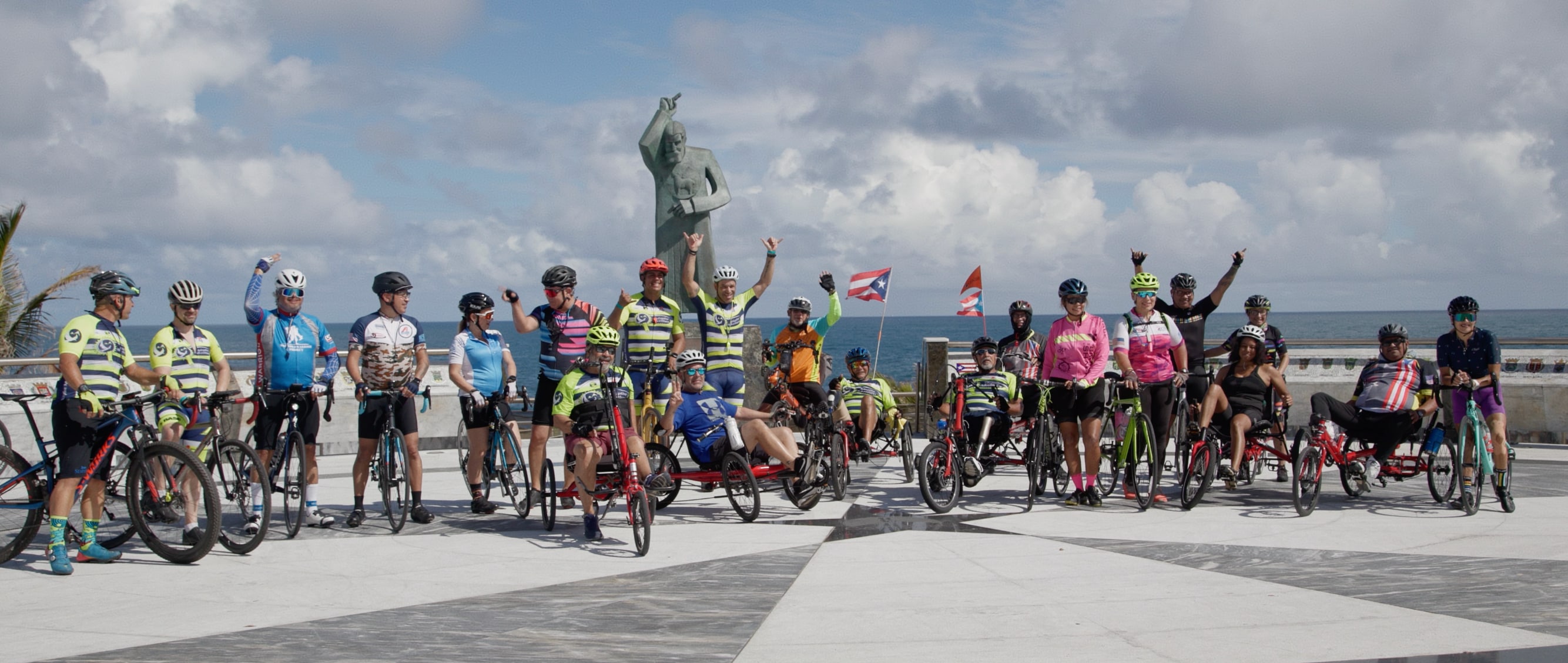José Rodriguez is a Puerto Rico Army National Guard veteran who was shot 21 times as a bystander at a red light during an armed car robbery. He spent two weeks in a coma, and emerged partially paralyzed. After the accident, Rodriguez struggled to keep going. “I was feeling very, very down about what had happened,” he says in Spanish. Depressed about no longer being in what he considered “peak condition” as an active military member, he fought to regain confidence and face the future of his situation. Now, he has rediscovered the joy and power of being outside. “A person with an amputated leg doesn’t think they can climb a mountain,” he says. “Adaptive Adventures encourages us to do things we didn’t think we could do.”
Adaptive Adventures is a nonprofit mobile adaptive sports program that provides training, education, gear and other infrastructure in underserved areas. It’s also a grantee partner of the REI Cooperative Action Fund, with a mission to create a more equitable outdoors for everyone. The organization has worked since 1999 to make recreation accessible for everyone. The group’s mission and participants are the subject of a new short film produced by REI Co-op Studios that follows Rodriguez and three other army and marine corps veterans as they share their outdoor experiences with the group.
“For me, adaptive means making the most of what you have—whatever that means,” says Craig DeMartino, an Adaptive Adventures climbing manager who was dropped 100 feet while climbing in 2016 and sustained severe back and neck injuries, as well as the amputation of his right leg below the knee. He got involved with the group soon after. “When you get hurt that badly you just assume you’re going to get hurt again,” he says. “Then you realize, ‘OK, I need to deal with it. How do I become active again and how do I deal with a lifetime now of what this is going to be?'”
Some 42 million people in the United States have a disability, and most people will experience a disability in their lifetime, according to the U.S. Census Bureau and the Centers for Disease Control. While progress has been slow, the landscape of outdoor recreation is evolving to make accommodations for a greater number of people. In 2015, the National Park Service (NPS) developed a five-year strategic plan to improve national park access for people with disabilities, and began making critical infrastructure updates, like redesigning physical spaces and rebuilding trails to be more navigable for visitors using wheelchairs and other adaptive gear. The Forest Service has made similar recommendations. Industry leaders and advocacy groups have also started calling into question ideas about who gets to participate in outdoor culture and what it means to be outdoorsy.
Adaptive Adventures has spent the last two decades advocating for inclusion in the outdoors. “We make the perceived impossible possible,” says Chelsea Elder, Adaptive Adventures’ executive director. “There are adaptations for everyone with a physical disability. If it doesn’t exist, we will come up with something.” This is key to Adaptive Adventures’ approach: The organization hosts a range of programs—its small-but-nimble team currently organizes some 650 experiences annually, from single-day experiences to multiday trips in the U.S., Puerto Rico and Canada. And it works with more than 180 outdoor outfitters to create adaptive opportunities where none exist, or where infrastructure is lacking.
One of Adaptive Adventures’ primary goals is to help participants become independent in the activities they love. That could mean bringing an activity program to an underserved area, the way the nonprofit introduced adaptive cycles to Puerto Rico in 2017. It might mean putting skilled personnel in place to ensure participant safety, as it did with its ski and snowboarding programs in Jackson Hole, Wyoming, in the early 2000s. Or it might involve outfitting athletes with adaptive gear, a major barrier to entry for many active pursuits.
The group settles for nothing less than lasting change. “Our goal is not to come into the community, provide the service one time and leave,” says Elder, who hopes to one day see adaptive options become commonplace. “We want it to be that you can go anywhere and be served,” she adds.
Most members of the Adaptive Adventures staff either have a disability themselves or care for a family member with a disability. They’re also trained to support participants experiencing mental health crises, since people with disabilities report experiencing mental distress nearly five times as often as adults without disabilities.
Athletes don’t need previous outdoor experience in order to get involved with the group, nor must they own special equipment. Participation is always free, thanks to a combination of fundraising, grants (including a grant partnership with the REI Cooperative Action Fund), corporate sponsors and donors.
The group serves adults and children with physical and other disabilities; veterans make up about 55% of Adaptive Adventures’ participants. Its programs range from sports like climbing, cycling, skiing and snowboarding to water activities like dragon-boat racing, kayaking, paddle boarding and whitewater rafting.
“Being in the outdoors, in a group that actually understands what you’re going through—it changed my life,” athlete Rebeca Garcia says, in the film. Garcia experienced depression and anxiety following her term in the U.S. Army. “Once you get there and you realize that you did it, you feel that pride and that amazement and also the beauty of it—the beauty of the world.”
The aim is to make that beauty accessible for all people and bodies. “We’re normalizing adaptation in sport,” Elder says.
To learn more about Adaptive Adventures, visit adaptiveadventures.org.
About the REI Cooperative Action Fund
Adaptive Adventures is a member of the REI Cooperative Action Fund grantee community. The REI Cooperative Action Fund is a community-driven nonprofit that supports organizations creating a more equitable outdoors for everyone. The Cooperative Action Fund gives grants to organizations that work to connect people, create space and center health outdoors.
